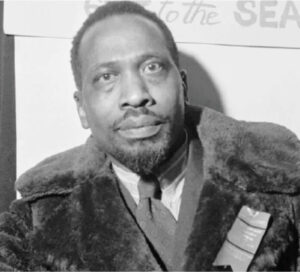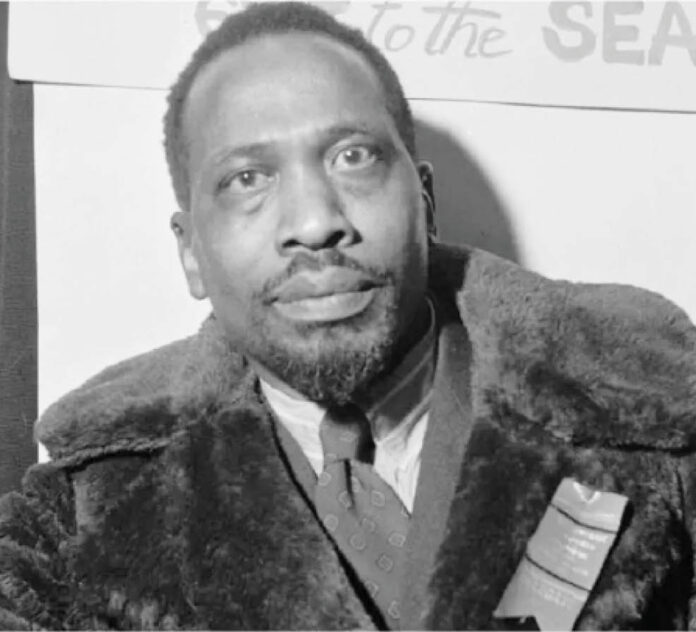

In October 1945, delegates from across the world descended on a town hall on the outskirts of Manchester city centre to attend a seismic event in African politics, the ripple effects of which still resonate 80 years later.
The Fifth Pan-African Congress, held between 15 and 21 October 1945, was a key moment for the movement that liberated many Africans from colonial rule.
Among those who attended were Obafemi Awolowo, one of the driving forces of Nigerian independence, feminist and human rights campaigner Amy Ashwood Garvey, Trinidadian radical George Padmore and the future presidents of Malawi, Ghana and Kenya – Hastings Banda, Kwame Nkrumah and Jomo Kenyatta.
But it was not, as its name makes clear, the first such gathering, so how did it come to have such significance and why was it held in Chorlton-on-Medlock Town Hall?
What is Pan-Africanism?
Pan-Africanism is a philosophy which held that all people of African descent should unite to stand against racial injustice, inequality and colonialism in Africa.
It began in the mid-19th Century but came to the fore in the early 20th Century, when Trinidadian barrister Henry Sylvester Williams organised the First Pan-African Conference in London in 1909.
That event was followed by Pan-African Congresses in 1919, 1921 and 1923, which were held either solely or jointly in Paris, London, Brussels and Lisbon, four cities which had been the seats of European colonial power, before a fourth event in New York in 1927.
Each congress ended with a list of resolutions, which were mainly made around the need for more rights for Africans, for the end of British rule and for home rule and a say in the governance of their own countries.
Why was Manchester chosen?
The Pan-African movement was disrupted by world events in the 1930s and 1940s and did not hold a congress again until after the end of World War Two.
Its leading figures were keen to get things going again after that conflict was finally ended with Victory over Japan Day on 15 August 1945.
Within two months, delegates were filing into the main chamber at Chorlton-upon-Medlock Town Hall to see the start of the Fifth Pan-African Congress.
Its aim was to tackle the post-war struggle against racial discrimination and help its delegates find a path to liberation for those living under what they saw as unjust colonial rule.
Harry Eyre, an expert on the congresses who helps with the documenting of black histories as the librarian for the Ahmed Iqbal Ullah RACE Centre and Education Trust, said there were a “plethora” of reasons why the city was chosen to host.
The main one, he said, was the strength of black communities and their established network of businesses in Manchester.
Ras T. Makonnen, for example, owned a number of restaurants, hotels and nightclubs, so people travelling from all over the world had places to stay and eat.
He acted as treasurer for the congress and is named on a plaque commemorating the congress on the building where it was held, which is now part of Manchester Metropolitan University.
Harry said Makonnen was friends with Padmore, who has been described as “one of the most influential black political thinkers of the 20th Century”, and the pair were both instrumental in bringing the event to Manchester.
Harry’s colleague Maya Sharma, the head of the trust, added that in their archives, there was evidence that there had been an “African and Caribbean presence in Manchester for decades”, long before the arrival of the Windrush generation.
She said the Oxford Road area around the town hall had a flourishing black community with businesses such as cafes, restaurants and a bookshop.
Who was involved?
Many of the delegates at the congress were political heavyweights, activists and vocal supporters of the Pan-African movement.
They came from Manchester and the surrounding area, from other parts of Great Britain and more than 25 other countries, the majority of which were still part of the what had become known as the British Commonwealth of Nations.
They represented more than 50 organisations and political associations, from the Women’s International League for Peace and Freedom to the Communist Party of Great Britain.
Alongside Awolowo, Ashwood Garvey, Padmore, Banda, Nkrumah and Kenyatta were the likes of African National Congress activist and writer Peter Abrahams, Sierra Leone People’s Party founder Lamina Sankoh, All African Convention founder Davidson Don Tengo Jabavu and Tikiri Banda Subasinghe, who would go on to serve as the Speaker of the Sri Lankan Parliament.
There was also at least one delegate who had been there from the start, as the congress chairman was William Edward Burghardt Du Bois, the African American thinker and journalist who had helped to organise the first event in 1919.
Why was it so significant?
Harry said the congress was unique as the previous ones had involved primarily people of upper classes and of professional backgrounds.
In Manchester though, the event catered for a much larger demographic of activists from all over the world as well as also from black communities in the UK and specifically the city itself.
He said while its impact was not “instantaneous”, it “led to the success of independence movements” in decades that followed across the British Empire and other colonial strongholds.
He said Jomo Kenyatta and Kwame Nkrumah, who would go on to lead homelands of Kenya and Ghana independence, came together to plan the means with which they would eventually achieve that.
“It was a sort of zenith of the movement, the beginning of the struggle after the Second World War,” he added.
Maya said the Manchester event “raised some very clear demands” which included an end to colonial rule in Africa and the Caribbean and racial equity for people of African heritage everywhere.
“They also demanded economic justice and fair wages,” she said.
Source: BBC
